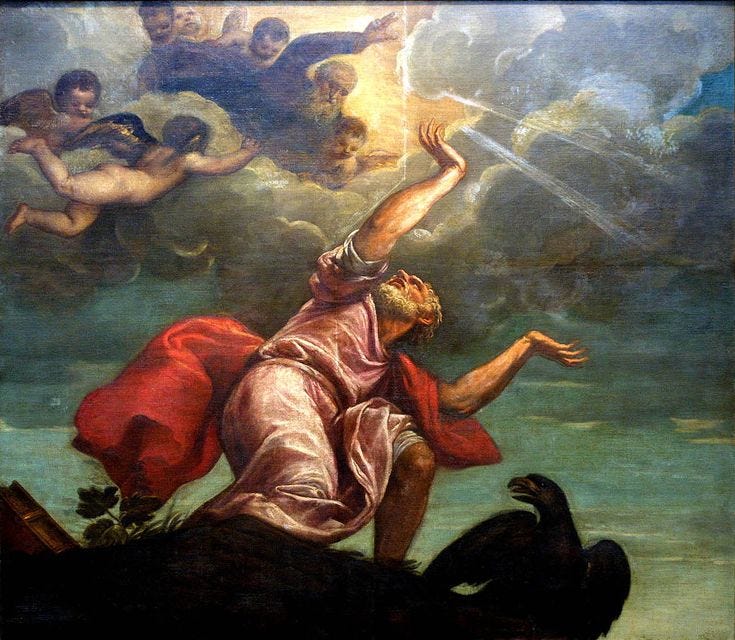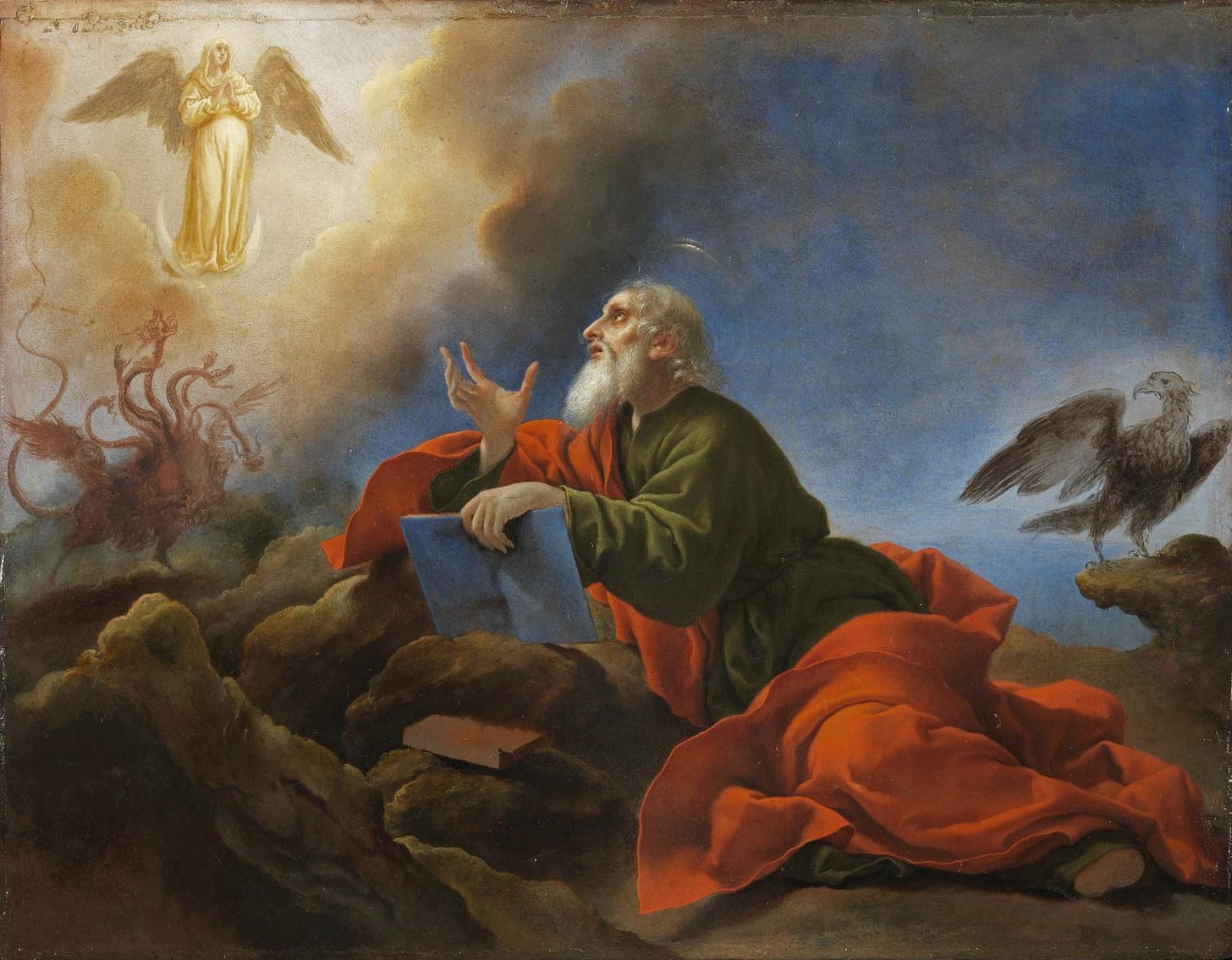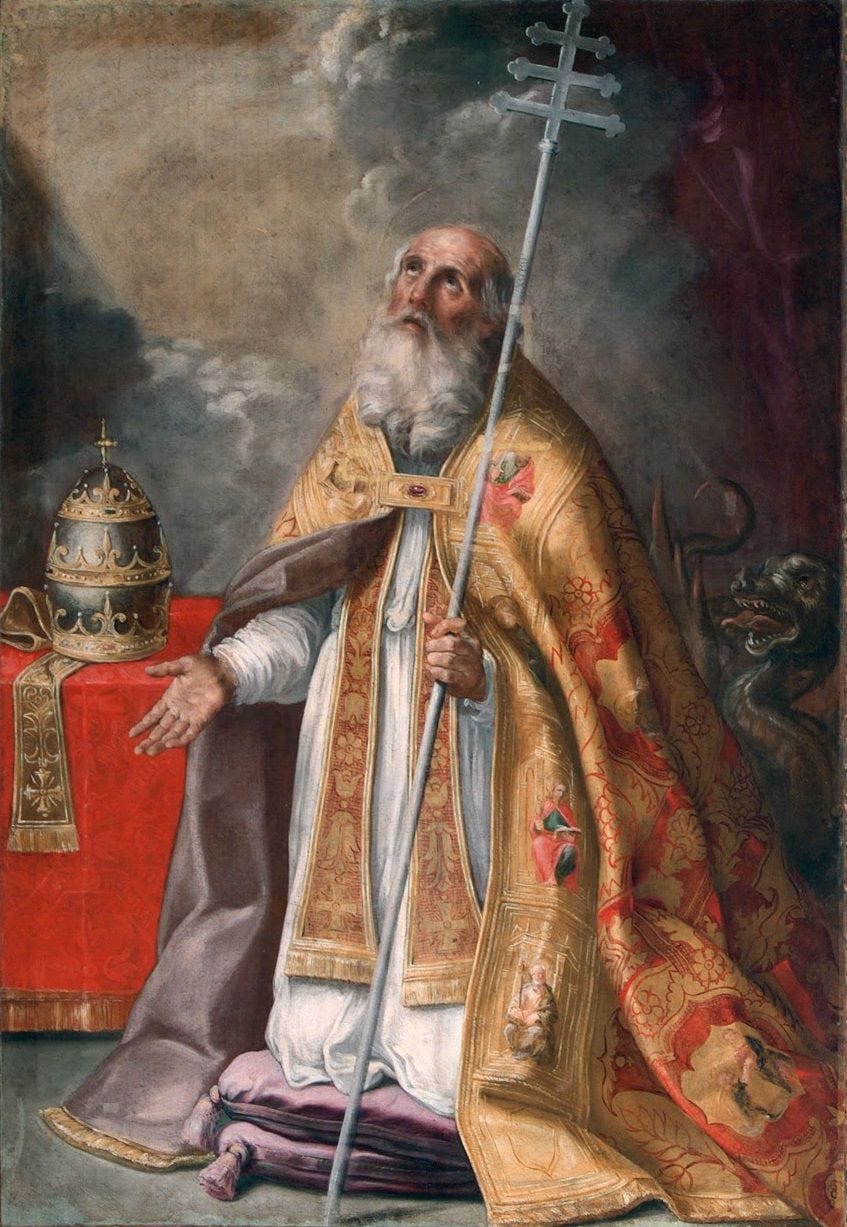On this the Seventh Day of Christmas, Feast of St Sylvester, and final day of the civil year, we ask you to join us in this Novena to our Patron Saint, St John the Apostle. This Novena will conclude on the final day of the Octave of St John the Apostle.
My most loving Saint, St. John the Apostle, behold me kneeling at thy feet, beseeching thee with all the affection of my heart to grant me thy special protection, particularly when in danger of offending God. O my dear and holy advocate, remember me before the throne of the most holy Trinity, and obtain for me from the infinite goodness of God, the virtues of humility, purity, obedience, and the grace to fulfill exactly the duties of my state.
Our Father, Hail Mary, Glory
II. O my dear Saint, St. John the Apostle, I renew to the Lord, through thee, the holy resolutions which I have frequently made of intending to love and serve Him faithfully. I am resolved to detach myself from every earthly thing, and I desire ardently to unite myself to Him, as my first beginning, last end, and sovereign good. My dear Saint, I beseech thee to offer to the most holy Trinity the sacrifice of my whole being, particularly of my judgment and will, in order to conform fully to God most holy, because I desire nothing else besides His grace and His holy love.
Our Father, Hail Mary, Glory
III. My sweet and holy Protector, St. John the Apostle, behold me again full of love for thee and full of confidence, beseeching thee to cast thyself on thy knees before the throne of the most holy Trinity, and entreat most ardently that God, through His infinite goodness, may grant me the grace to fly sin, and the gift of final perseverance. Thou knowest, O my dear St. John the Apostle, how great are the temptations to which man is subject, and how continual are the perils I run of being lost; do thou assist me with thy efficacious prayers.
Our Father, Hail Mary, Glory
ON THE GOSPEL OF GIRDING THE LOINS, &c., LUKE xii. 35, &c, READ FOR ST. SILVESTER
Consider first, those words of our Lord to his disciples, and in them, to all Christians; 'let your loins be girt, and lamps burning in your hands; and be you like to men who wait for their Lord, when he shall return from the wedding: that when he cometh and knocketh, they may open to him immediately. Blessed are those servants, whom the Lord when he cometh shall find watching.' This girding of our loins, and having lamps burning in our hands, are to be taken in a spiritual sense, as containing great and necessary lessons for every part of our lives. As we know not the hour when our Lord will come to us, and knock at our door by death, we must keep ourselves always awake, and in a proper posture and readiness to open to him without delay, and to welcome him. Now, this proper posture and readiness to welcome our Lord whensoever he shall come and knock, chiefly consists in those two things, in having our loins always girt by a constant restraint of our irregular inclinations and lusts; and having lamps always burning in our hand, by the constant exercise of Christian virtues; which may shine forth to the glory of God and the edification of our neighbours. And those servants are happy indeed, who are always waiting for the coming of their Lord, with their loins girt in this manner, and holding such lamps as these always burning in their hands.
Consider secondly, what follows in the same gospel, with regard to the immense reward of these faithful servants. 'Amen, I say to you, that their Lord will gird himself, and make them sit down to meat, and passing will minister to them.' Christians, what an honour, what a happiness is here promised us, if our Lord, at his coming, shall find us watching! He will gird himself to be ready to wait upon us; and he will make us sit down to table; and he will pass and minister to us. O, what incomprehensible joys are here signified by our Lord's ministering to us, by us making himself, as it were, over to us, to be perpetually enjoyed by us! O, what a table is this, at which we shall be invited to sit down, to be eternally entertained by him with all the delights of heaven,; with the sweet fruits of the tree of life, and the delicious waters of the fountain of life! And lest we should be discouraged by the apprehension of our being excluded from this eternal banquet, because we have already passed a good part of our lives without being in that readiness which our Lord expects of us at the time of his coming, he adds for our comfort, that 'if he shall come in the second watch; or if he shall come in the third watch, and shall then find us watching,' we shall still be happy. 'Blessed', said he, 'are those servants.' So that, if we have hitherto been careless; if we have let the first, or even the second watch pass, without being upon our guard, and he has been so good as not to come and surprise us; let us now at least awake, let us gird our loins now, and have our lamps, for the future, burning in our hands, and we may still be blessed.
Consider thirdly, the remaining words of this gospel: 'But this know ye,' saith our Lord, 'that if the householder did know at what hour the thief would come, he would surely watch, and would not suffer his house to be broken open. Be ye also ready; for at what hour you think not, the Son of Man will come.' This is that great lesson of always watching, which our Saviour perpetually inculcates as our only security against the dreadful evil of an unprovided death; and all those endless evils, which are the unhappy consequence of an unprovided death. O let us lay up this lesson in our hearts; let us meditate daily upon it; let us conform ourselves to it in the practice of our lives. O, let us always watch! Our Lord, who has borne with us all this year, has in the meantime knocked at the door of thousands of others, who this day twelvemonth were as likely to live as ourselves. Their bodies are now corrupting in their graves; but O! where are their souls? And where shall our bodies, where shall be our souls be, a twelvemonth hence? Let us then be always ready; because we know not the day, nor the hour, when our Lord shall come.
Conclude to observe well these evangelical prescriptions, of girding your loins, of having your lamps ever burning in your hands, and of being always ready to open the door to him; and you shall not fail of being of the number of those happy servants that shall enter into the eternal joy of their Lord.1
— Bishop Richard Challoner
So far, the only ones we have seen standing round the Crib of our Jesus have been Martyrs: Stephen, overwhelmed with the shower of stones; John, the Martyr in heart, who survived his fiery torture; the Holy Innocents, massacred by the sword; Thomas, murdered in his Cathedral—these are the champions of Christ, who keep guard in the palace of Bethlehem. Yet all Christians are not called to be Martyrs. Besides this countless battalion of the King’s favorite soldiers, there are other troops of sainted heroes which form the heavenly army—and amongst these, there are the Confessors, who conquered the world without shedding their blood in the combat. Though the place of honor in the service of the King belongs to the Martyrs, yet did the Confessors fight manfully for the glory of his name and the spreading of his Kingdom. The palm is not in their hands, but they are crowned with the crown of justice, and Jesus, who gave it to them, has made it be part of his own glory that they should be near his throne.
The Church would therefore grace this glorious Christmas Octave with the name of one of her Children, should represent, at Bethlehem, the whole class of her unmartyred Saints. She chose a Confessor—St. Sylvester: a Confessor who governed the Church of Rome, and therefore the universal Church; a Pontiff whose reign was long and peaceful; a Servant of Jesus Christ adorned with every virtue, who was sent to edify and guide the world immediately after those fearful combats, that had lasted for three hundred years, and in which millions of Christians had gained victory by martyrdom, under the leadership of Thirty Popes—predecessors of St. Sylvester—and they too all Martyrs.
So that Sylvester is messenger of the Peace, which Christ came to give to the world, and of which the Angels sang on Christmas Night. He is the friend of Constantine; he confirms the Council of Nicaea; he organizes the discipline of the Church for the new era on which she is now entering—the era of Peace. His predecessors in the See of Peter imaged Jesus in his sufferings; Sylvester represented Jesus in his triumph. His appearance during this Octave reminds us that the Divine Child who lies wrapped in swaddling clothes and is the object of Herod’s persecution is, notwithstanding all these humiliations, the Prince of Peace, the Father of the world to come…
The Civil Year ends today. At Midnight, a New Year will begin, as the world counts time, and the present one will sink into the abyss of eternity. It is one step further on in our lives, and brings us nearer to that end of all things which St. Peter says is at hand. The Liturgy, which brings a new Ecclesiastical Year on the First Sunday of Advent, has no special prayers in the Roman Church, for the beginning of the Year on the First of January; but her spirit—which takes an interest in everything affecting the well-being of individuals or society at large—her spirit is, that we should, sometime in the course of this last day of the Year, make a fervent act of thanksgiving to God for the blessings he has bestowed upon us during the past twelve months.
Rome sets us the example. Today, the Sovereign Pontiff goes, in state, to the Gesù (or, as we should call it, Jesus’ Church), and there assists at a solemn Te Deum; the Benediction of the Blessed Sacrament follows it, blessing, as it were, the public act of thanksgiving, and giving a pledge of blessings for the coming Year.
The only Church that has given a Liturgical expression to the sentiments which the close of the Year inspires is that of the Mozarabic Rite, in which there occurs the following beautiful Preface, which we gladly offer to our readers. It is part of the Mass of the Sunday which immediately precedes the Feast of the Epiphany.2
It is meet and just, that we should give thanks to thee, O Holy Lord, Eternal Father, Almighty God, through Jesus Christ thy Son, our Lord; who being, before all time, born of thee, God the Father, did, together with thee and the Holy Ghost, create all seasons, and deigned himself to be born in time, from the womb of the Virgin Mary. He, though the eternal One, established the fixed revolutions of years, through which this world runs its course, and divided the Year by regular and suitable changes of Seasons, wherewith the Sun should, in orderly variety, mark the round of the Year, as he ran the measured circuit of his course. For we, this day, dedicate, by the gifts we offer, the close of the past year, and the commencement of that which follows, unto Him, the living God, by whose mercy we have lived through the years gone bye, and are about to commence the beginning of another. Since, therefore, a sacred devotion, wherein we all share, has this Year brought us together to invoke this thy Divine Son, we pour out our humble prayers unto thee, O God, the Father! that, whereas thou hast consecrated the present portion of the year by the Birth of this same thy Son—thou mayest vouchsafe to make this year a happy one unto us, and to give us to spend it in thy service. Fill, too, the earth with its fruits, and deliver our souls and bodies from sickness and sin. Take away scandal, defeat our enemy, keep down famine, and drive far from our country all such events as would bring evil upon her. Through our Lord Jesus Christ. Amen.
—The Liturgical Year by Dom Prosper Gueranger
https://liturgialatina.org/challoner/dec25.htm#31
https://sensusfidelium.com/the-liturgical-year-dom-prosper-gueranger/december/december-31-st-sylvester-pope-and-confessor/







